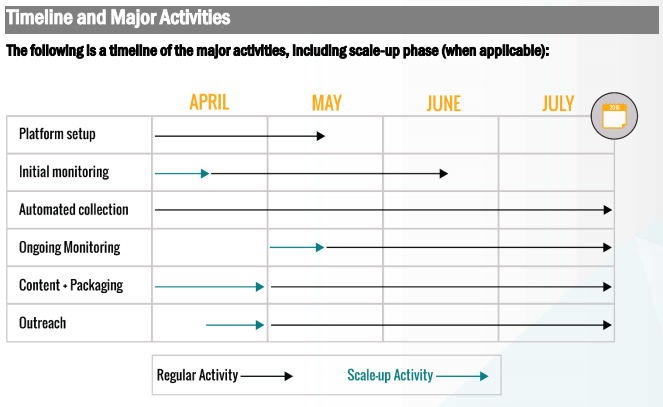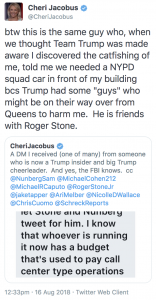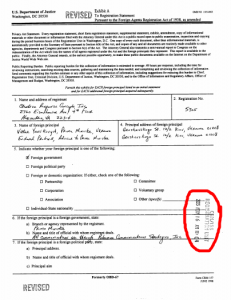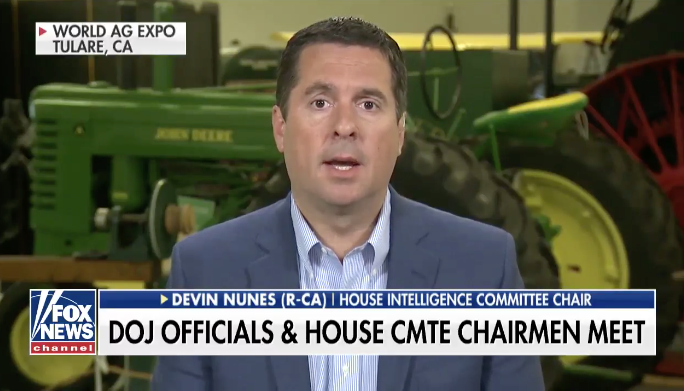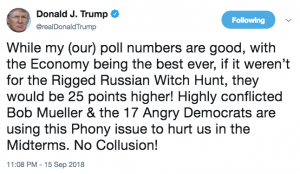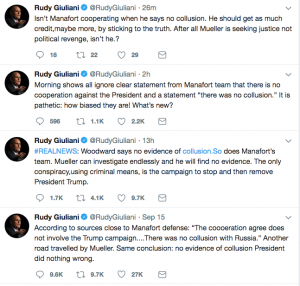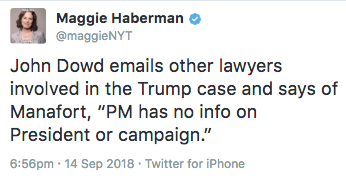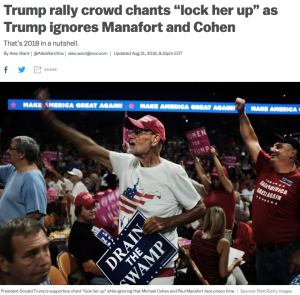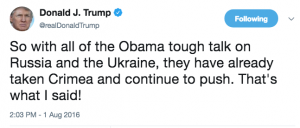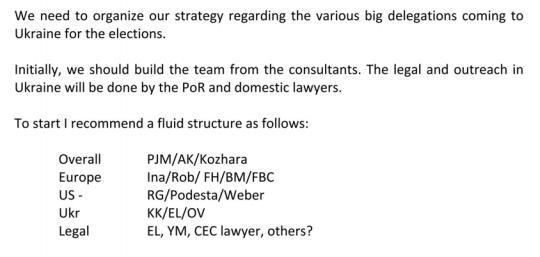Robert Mueller has a slew of really good lawyers working for him. But I think his biggest asset is Donald Trump’s bubble.
Consider this NYT story, in which a bunch of lawyers anonymously blame each other for getting 16 months into the Special Counsel investigation without ever figuring out what the President did.
The lawyers have only a limited sense of what many witnesses — including senior administration officials and the president’s business associates — have told investigators and what the Justice Department plans to do with any incriminating information it has about Mr. Trump, according to interviews with more than a dozen people close to the president.
What is more, it is not clear if Mr. Trump has given his lawyers a full account of some key events in which he has been involved as president or during his decades running the Trump Organization.
[snip]
Mr. Dowd took Mr. Trump at his word that he had done nothing wrong and never conducted a full internal investigation to determine the president’s true legal exposure.
[snip]
And once Mr. Dowd was gone, the new legal team had to spend at least 20 hours interviewing the president about the episodes under investigation, another necessary step Mr. Dowd and his associates had apparently not completed.
In spite of the effort to blame all this on Dowd, the NYT article provides abundant evidence (which they, in typical Maggie and Mike fashion, don’t seem aware of) that Trump’s lawyers continue to be clueless.
There’s the notion that just 20 hours of Trump interviews would be sufficient for nailing down the actual story. Don McGahn, after all, has had 30 hours of interviews with Mueller’s team, and while he has played several central roles, he’s not the principal. And, unlike Trump, he can and presumably did tell a mostly consistent story.
There’s the admission that Trump’s lawyers actually don’t know how ten senior officials testified.
During Mr. Dowd’s tenure, prosecutors interviewed at least 10 senior administration officials without Mr. Trump’s lawyers first learning what the witnesses planned to say, or debriefing their lawyers afterward — a basic step that could have given the president’s lawyers a view into what Mr. Mueller had learned.
Complain all you want that Dowd didn’t obstruct competently. But the Joint Defense Agreement (the one that gave Rudy no advance warning that Paul Manafort had flipped on the President) is what Rudy has always pointed to to justify his confidence that Trump is not at any risk. So Rudy is, by the standards of the anonymous people leaking to Maggie and Mike, just as incompetent.
Perhaps best of all is the claim of an anonymous Maggie and Mike source that poor Jay Sekulow was left to clean up after Dowd’s, and only Dowd’s, mistakes.
In March, Mr. Dowd resigned, telling associates that he disagreed with the president’s desire to sit for an interview with Mr. Mueller — one form of cooperation he opposed — and leaving Mr. Sekulow with the task of rebuilding the legal team from scratch, and without knowing many of the details of the case. Mr. Dowd left few notes or files about the case, which had to be recreated months after the fact.
Somehow, Ty Cobb, the guy brought in after Marc Kasowitz left amid concerns that Trump was obstructing justice, who oversaw responding to discovery requests and who was initially celebrated as being very aggressive, gets no blame. Cobb was the guy who put McGahn in a defensive crouch — leading directly to 20 of his 30 hours of testimony — after blabbing in public about him hiding documents.
Crazier still, Jay Sekulow gets no blame in this narrative, even though Sekulow was around during all of Dowd’s purportedly mistaken decisions. As recently as March, Sekulow was quite confident that his undeniable expertise in litigating the right wing’s ressentiment prepared him to deal with the challenges of a Special Counsel investigation.
When Jay Sekulow joined President Donald Trump’s legal team for the Russia investigation last summer, he was largely expected to serve as the public face of the group. But after former lead attorney John Dowd resigned last week, and with other top lawyers reportedly reluctant to join the team, Sekulow is now the key player in one of the most high-stakes investigations in the world.
“I have maintained since the beginning of the representation that my interest is representing the client,” Sekulow tells TIME. “And it may take different forms at different times, and we’re just right now in a different phase.”
[snip]
Peter Flaherty, who worked for Romney on both campaigns and has known Sekulow for more than a decade, offers effusive praise for Sekulow that draws on the world of Boston sports.
“Jay is a combination of Bill Belichick and Tom Brady, wrapped into one super-lawyer,” Flaherty says, citing the New England Patriots’ coach and quarterback. “He is capable of both devising successful strategy in a conference room, as well as being able to execute it in a courtroom.”
Critics say that legal expertise in high-minded constitutional issues won’t translate well to the guts of a criminal case. But Sekulow says he feels his “broad background” in the law has prepared him for the current challenge, citing a recent case he worked on in which the IRS admitted to unfairly scrutinizing tax forms of conservative groups.
In the wake of Manafort’s plea deal, Sekulow seems less certain he’s got control of the situation.
Here’s the thing though. This is a 2,100-word story presented as truth, disclosing evidence (albeit unacknowledged) that the lawyers who have serially managed press outreach (Sekulow, then Rudy) are clueless. It repeats, as Maggie and Mike always do, two key threads of the spin from these men: that Trump’s only exposure is obstruction and that the end result will be a report.
[Manafort’s] plea brings to four the number of former close associates of Mr. Trump who have agreed to cooperate with Robert S. Mueller III, the special counsel investigating Russian interference in the election and obstruction of justice by the president.
And while Mr. Trump’s lawyers insist Mr. Mueller has nothing on their client about colluding with Russia, they are bracing for him to write a damaging report to Congress about whether the president obstructed justice.
[snip]
The sense of unease among the president’s lawyers can be traced, in part, to their client. Mr. Trump has repeatedly undermined his position by posting on Twitter or taking other actions that could add to the obstruction case against him.
[snip]
Even after Mr. Mueller’s appointment, Mr. Trump did things like ask witnesses about what they told Mr. Mueller’s investigators and put out misleading statements about contacts between his campaign and Russia, which appear to have deepened the special counsel’s examination of possible obstruction.
A mere review of Jay Sekulow’s own list, drafted in March, of questions Mueller might ask Trump, should make it clear to anyone exercising a tiny degree of skepticism that the claim Mueller is exclusively focused on obstruction is utter nonsense. And after the speaking criminal information released with Manafort’s plea, the expectation of a report should be treated far more critically.
But it’s not.
In an article about how Trump’s lawyers, generally, are clueless, and demonstrating though not reporting that the lawyers providing information to the press are part of that general cluelessness, Maggie and Mike don’t pause to reflect on whether that leaves them, too, clueless.
So when Trump tries to understand his plight by reading Maggie and Mike, he would believe a fiction largely created by the lies he has already told his lawyers and his preference for PR rather than solid legal advice.
Of course, it gets worse from there. Trump has benefitted from nine months of Devin Nunes-led intelligence, fed both via staffers and through a stable of incompetent right wing stenographers, about the investigation. I know for a fact that the most competent Republicans who have read the most investigative documents do not have a grasp about either the scope of the investigation or how it evolved (though someone at least understands that after August 1, 2017, the investigation got far more risky for the President).
But when you take that misunderstanding about the investigation and launder it through incompetent hacks like John Solomon, then the picture it provides is even more misleading.
Which led us to Trump’s decision on Monday to declassify a bunch of stuff.
That led Mark Warner, who has a better though still incomplete understanding of the potential risk to Trump, to quip, “Be careful what you wish for,” suggesting that the documents might be very incriminating to Trump.
Batshit crazier still, Trump went on to do an interview with the aforementioned John Solomon. (The Hill, unlike the NYT and virtually all other outlets, has the dignity to label interviews where Trump tells reporters a bunch of bullshit “opinion.”) In it, Trump suggests he had the authority and should have fired Jim Comey they day he won the primaries (an interesting suggestion by itself as Mueller appears to be investigating Roger Stone’s activities from that time period), which would likely have resulted in a Hillary win.
“If I did one mistake with Comey, I should have fired him before I got here. I should have fired him the day I won the primaries,” Trump said. “I should have fired him right after the convention, say I don’t want that guy. Or at least fired him the first day on the job. … I would have been better off firing him or putting out a statement that I don’t want him there when I get there.”
Crazier still, Trump admits that he has no idea what is included in the vast swath of documents he has already ordered to be released.
Trump said he had not read the documents he ordered declassified but said he expected to show they would prove the FBI case started as a political “hoax.”
“I have had many people ask me to release them. Not that I didn’t like the idea but I wanted to wait, I wanted to see where it was all going,” he said.
In the end, he said, his goal was to let the public decide by seeing the documents that have been kept secret for more than two years. “All I want to do is be transparent,” he said.
As I’ve noted here and elsewhere, even careful readers, to say nothing of the frothy right, have little visibility on how this investigation evolved (even the tiny bit more visibility I have makes me aware of how much I don’t know). If the smartest Republican upstream of Trump’s concerns about the genesis of the investigation doesn’t understand it, then far stupider Congressmen like Mark Meadows, who hasn’t reviewed all the documents, is surely misrepresenting it.
And yet Trump, from within the bubble of sycophants, clueless lawyers, and credulous reporters is blindly taking action in the hope of undercutting the pardon-proof plea deal of his campaign manager.
Update: Thanks to those who corrected my error in the bracketed description of the fourth plea.
As I disclosed in July, I provided information to the FBI on issues related to the Mueller investigation, so I’m going to include disclosure statements on Mueller investigation posts from here on out. I will include the disclosure whether or not the stuff I shared with the FBI pertains to the subject of the post.



